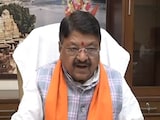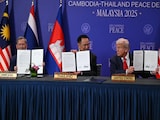Australia is set to host India, Japan and the United States for the fourth Quad Foreign Ministers' Meeting in Melbourne on Friday and the top diplomats are seeking to bolster cooperation in areas including economy, security, coronavirus pandemic and free and open Indo-Pacific.
The Quadrilateral Security Dialogue (Quad) is a partnership of Australia, India, Japan and the US, each of whom shares a commitment to openness and transparency and challenges posed by China and the situation in Ukraine
This is the first time Quad Foreign Ministers are meeting since the two Quad Summits last year. Australian Foreign Minister Marise Payne will be joining Indian Minister of External Affairs Dr S Jaishankar, Japanese Minister for Foreign Affairs Hayashi Yoshimasa, and United States Secretary of State Antony Blinken to discuss the positive and ambitious agenda of the Quad.
They will be discussing ongoing Quad cooperation in their bilateral phone calls and meetings. Since there is a robust bilateral cooperation between the four countries, they are building on their institutional linkages to further Quad cooperation in areas such as healthcare, infrastructure, space, education etc.
Further, bilateral agencies such as India's Development Partnership Administration; Japan International Cooperation Agency; Japan Bank for International Cooperation US Development Finance Corporation; USAID etc. will be actively involved in the implementation of these initiatives.
Meanwhile, Quad partners have achieved many targets in flagship projects. The Quad Vaccine Partnership, announced in March 2021 by the Leaders, to deliver one billion doses of Quad vaccines to the Indo-Pacific region by the end of 2022 has witnessed good progress under this initiative.
The Quad Partnership COVID-19 Dashboard was launched by Leaders at the September 2021 Summit to coordinate and monitor our collective assistance to the Indo-Pacific.
Following the launch of the Quad Working Group on Critical and Emerging Technologies in March 2021, four subgroups or Line of Effort was established, with each country leading on one group.
The group drafted the Quad Principles on Technology Design, Development, Governance and Use, which was adopted by the Leaders at the Quad Summit in September.
The group is pursuing work on 5G and Vendor Diversification to maintain a diverse, open and interoperable telecommunication ecosystem.
Quad's work on climate change acquired relevance with the COP26 held in November 2021. After the Leaders announced the Climate Working Group in March 2021, the Quad Climate Change Working Group is looking at assisting clean energy transitions of Indo-Pacific members and helping chart their strategies for the energy transition to meet their mid-century net-zero commitments.
The Quad WG on Climate Change is working on strengthening climate actions through mitigation, adaptation, resilience, technology, capacity-building, and climate finance and has organized its work under three pillars- Climate Ambition; Clean Energy Innovation and Deployment; and Adaptation, Resilience and Preparedness.
One of the most promising areas Quad is working on is the Quad Green Shipping Network. Under this, Los Angeles, Mumbai Port Trust, Sydney (Botany), and Yokohama have formed a network dedicated to greening and decarbonizing the shipping value chain.
Quad is also looking at establishing two to three Quad low-emission or zero-emission shipping corridors by 2030.
Prime Minister Narendra Modi had proposed the Quad Green Hydrogen Partnership at the September Quad Leaders' Summit to strengthen and reduce costs across all elements of the clean-hydrogen value chain, leveraging existing bilateral and multilateral hydrogen initiatives in other fora.
Moreover, Quad partners have provided more than USD 48 billion in official finance for infrastructure in the Indo-Pacific region.
The Quad Infrastructure Coordination Group (QICG) announced by the Leaders in September 2021 is meeting regularly to share assessments of regional infrastructure needs and coordinate respective approaches to deliver transparent, high-standard infrastructure.
The Quad Space Working Group, announced by Leaders in September 2021, is discussing the exchange of Earth observation satellite data and analysis to help Indo-Pacific countries better adapt to climate change, prepare for natural disasters and better manage marine resources. The group will also consult on norms and guidelines for the sustainable use of outer space.
The Quad Senior Cyber Officials group, announced by Leaders in September 2021, is strengthening inter-agency cooperation and exchanging best practices to secure critical cyber infrastructure and build resilience against cyber threats.
Regarding, the High availability disaster recovery (HADR), the Quad first came together to respond to the Indian Ocean Tsunami in 2004. Since then, Quad countries have responded to many natural disasters in the region.
India has proposed strengthening cooperation in this area to deliver timely and effective relief and assistance during disasters and humanitarian crises such as the recent volcano in Tongo and the COVID pandemic.
Further, India has proposed Quad cooperation in the field of higher education to discuss opportunities for student exchanges, joint research and collaboration in priority areas and mutual recognition of documents etc.
The Quad STEM Fellowships, announced by Leaders in September 2021, is one of the elements of Quad cooperation in education. The Fellowships would provide 25 graduate/doctoral students from STEM fields from each Quad country scholarships to study in leading US universities.
(Except for the headline, this story has not been edited by NDTV staff and is published from a syndicated feed.)















